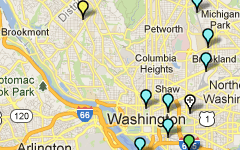Fort Totten Real-Time Parking Pilot
One of the challenges Metro faces is how to best support Parking customers. Good data on parking space utilization at metered Kiss and Ride spaces can be hard to come by and finding a metered parking space at many stations can involve guesswork. To address this lack of space availability information, Metro is beginning a 1-year pilot of sensors in parking spaces at the Fort Totten Metro Kiss and Ride parking lot to capture data on space availability and usage and to facilitate payment. These battery-powered sensors will be mounted flush with the pavement in each parking space, and communicate information on availability and usage. These space sensors will last 5-7 years on their internal batteries, and provide nearly real-time information.
Additional sensors mounted inside the parking meters allow data to be captured on payment and immediately notify maintenance personnel of any outages to allow quick repair. In the near future, you’ll also be able to add time to these meters using your cellphone. This technology — provided by the San Francisco-based company StreetLine Inc. — has recently been deployed for on-street parking meters in San Francisco and Hollywood, CA.
If this pilot project succeeds at accurately detecting vehicles and collecting data on parking space availability, this parking detection technology can be rolled out to the other types of parking spaces available at Metrorail stations. Real-time information on parking availability can be provided over the web, on smartphones (like the iPhone, Android and Blackberry using the Parker app), and in the future, on roadside signs to help save customers time and make it easier to use transit. When you decide to pull off the highway and switch to Metro, we want to eliminate the guesswork and make sure you know where to find a parking space.




How about installing a sensor which can tell when people enter a metro parking lot, so you can track entrances against exits and get an idea of when the parking garages and lots fill up? Seems cheaper than installing a sensor in each parking space.
It seems to me that a more fundamental problem might be underpricing at Metro parking lots. If drivers regularly come to a Metro lot and find all the spots taken, that shows there is more demand than supply for parking spaces at that price. If that is the case, Metro should raise the price of parking.
Perhaps Metro just doesn’t have conclusive or persuasive data. Or perhaps there are other constraints on raising prices. (Like political considerations?)
I’m all for collecting more data. I think it would be great if this was the first step toward a variable-rate metering system for each space where spaces closer to the station entrance and lot exits cost more.
But would anyone be surprised if it turns out Metro spaces are under priced? Would Metro raise prices to improve efficiency, even at the cost of angering their customers?
@WRD
So, I have been troubled by full garages before, and I certainly understand the supply and demand principle, however:
Charging people more money to park in a garage is not really what we should be looking at.
When I was living in the McLean area, I had to drive to WFC, pay 4.50 to park, then 4.15 per direction in order to commute to work… do the math, that cost adds up quickly for the 23+ commute days per month.
It isn’t that I wanted to drive, actually it was quite the opposite, Where I was living had no bus routes, and the only place I could park-and-ride to convieniently was WFC. I am not complaining at all about the prices of parking at present, I understand the need to charge 4.50… I simply feel that raising the price is the wrong idea. Next thing you will suggest is to charge a peak of peak of peak because of the orange/silver crush that will occur when the Dulles Corridor Metro Project is nearing completion and trains start to run.
“Lets charge people more to alleviate the congestion” is not an answer to the problem UNLESS you provide additional services to justify those costs. Charging more to provide more spaces is reasonable, charging more which will ultimately lead to fewer cars in the lots, to fewer riders on the system, which generates less revenue is not the answer.